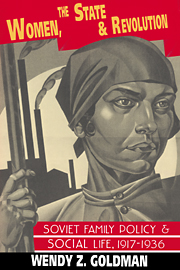Book contents
- Frontmatter
- Contents
- List of tables
- Acknowledgments
- 1 The origins of the Bolshevik vision: Love unfettered, women free
- 2 The first retreat: Besprizornost' and socialized child rearing
- 3 Law and life collide: Free union and the wage-earning population
- 4 Stirring the sea of peasant stagnation
- 5 Pruning the “bourgeois thicket”: Drafting a new Family Code
- 6 Sexual freedom or social chaos: The debate on the 1926 Code
- 7 Controlling reproduction: Women versus the state
- 8 Recasting the vision: The resurrection of the family
- Conclusion: Stalin's oxymorons: Socialist state, law, and family
- Index
- Soviet and East European Studies
3 - Law and life collide: Free union and the wage-earning population
Published online by Cambridge University Press: 26 March 2010
- Frontmatter
- Contents
- List of tables
- Acknowledgments
- 1 The origins of the Bolshevik vision: Love unfettered, women free
- 2 The first retreat: Besprizornost' and socialized child rearing
- 3 Law and life collide: Free union and the wage-earning population
- 4 Stirring the sea of peasant stagnation
- 5 Pruning the “bourgeois thicket”: Drafting a new Family Code
- 6 Sexual freedom or social chaos: The debate on the 1926 Code
- 7 Controlling reproduction: Women versus the state
- 8 Recasting the vision: The resurrection of the family
- Conclusion: Stalin's oxymorons: Socialist state, law, and family
- Index
- Soviet and East European Studies
Summary
The process of divorce is so simple that there is a loss of neither money nor time. Under the current law, the act of dissolving a marriage can be completed in fifteen minutes.
P. Zagarin, writer on the family, 1927The broad mass of people do not regard registration of marriage as the basis of marital relations. De facto voluntary unions are becoming ever more widespread.
A. Stel'makhovich, chairman of the Moscow provincial court, 1926The Bolsheviks believed that the freedom to divorce – to dissolve a union no longer founded on love – was essential to the freedom of the individual. The right to divorce was particularly important to women, whose true feelings and abilities were so often stifled by the unbreakable bonds of marriage. This idea was widely shared by most of the progressive, prewar intelligentsia. Liberal jurists tried repeatedly to reform Russia's unbending divorce laws. Tolstoy immortalized the desperate plight of a young mother in her struggle to free herself of a loveless marriage in his famous novel, Anna Karenina. And both Vera Figner, the leader of the terrorist People's Will, and Alexandra Kollontai, among countless others, struggled to escape the control of husbands and families.
Yet the issue of divorce had a class as well as a gender dimension. The young women rebels who fought for their rights to emotional fulfillment, education, and careers at the end of the nineteenth century came mainly from upper-and middle-class families.
- Type
- Chapter
- Information
- Women, the State and RevolutionSoviet Family Policy and Social Life, 1917–1936, pp. 101 - 143Publisher: Cambridge University PressPrint publication year: 1993
- 2
- Cited by



